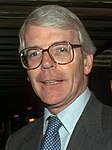Conservative Party (UK) leadership election, 1995
|
|
||||||||||||||||
|---|---|---|---|---|---|---|---|---|---|---|---|---|---|---|---|---|
|
||||||||||||||||
|
||||||||||||||||
|
||||||||||||||||
The 1995 Conservative leadership election was initiated when incumbent leader and Prime Minister John Major resigned as leader on 22 June 1995, in order to face his critics within the party. On 4 July 1995, he was re elected, beating the only other candidate, former Secretary of State for Wales John Redwood.
For some years the Conservative Party had been deeply divided on the issue of the European Union and there had been much speculation each year that Major would be challenged for the leadership during the annual re-election of the leader each November. Many both within and outside the party believed that the constant speculation was highly damaging and so Major took the dramatic step to force an early contest. He announced his decision in a speech in the garden of 10 Downing Street, famously challenging his party opponents to “put up or shut up”.
The Conservative government was also proving unpopular with the British public at the time, trailing the Labour Party in opinion polls and having suffered heavy losses in local elections for three successive years, as well as a poor performance in the previous year's European elections.
Under the rules at the time, (introduced in 1965 and modified in 1975), there would be a series of ballots, conducted by the 1922 Committee, with that committee's chairman, Sir Marcus Fox, serving as Returning Officer.
Since the leadership was vacant, candidates required the nomination of only two MPs. In the first round a candidate needed to win the backing of an absolute majority of MPs. In addition they needed to have a margin over their nearest rival of 15% of the total electorate.
Had neither of these been achieved, then a second ballot would take place the following week. Nominations would be reopened, and at this stage an absolute majority only would be required. If this did not happen, then the top two candidates would go forward to a third round.
Because of this process, the first round was widely regarded as the expression of confidence or otherwise in Major. Many speculated that if he did not achieve outright victory then he would resign, enabling more prominent Conservatives such as Michael Heseltine or Michael Portillo to stand in the second round.
...
Wikipedia


